-
ARTÍCULO DE REVISIÓN18/10/2022
Decision making by health professionals during COVID-19: an integrative review
Revista Brasileira de Enfermagem. 2022;75:e20210067
Resumen
ARTÍCULO DE REVISIÓNDecision making by health professionals during COVID-19: an integrative review
Revista Brasileira de Enfermagem. 2022;75:e20210067
DOI 10.1590/0034-7167-2021-0067
Visualizações1Ver maisABSTRACT
Objective:
To analyze the scientific production on the decision making of health workers during the COVID-19 pandemic.
Methods:
Integrative review in the databases CINAHL, MEDLINE, Scopus, ScienceDirect, WoS, and BVS. Inclusion criteria: original articles available in full, in any language, related to the object investigated.
Results:
During this pandemic, health workers have been making decisions based on ethical/bioethical principles (utility, beneficence, non-maleficence, autonomy, justice, proportionality, flexibility, clinical prognosis, duration of the need, and fair health attention), values (solidarity, equality, equity, utilitarianism, relational autonomy, reliability, reciprocity, maximization of the benefits and resources, and prioritization of those in worse conditions), beliefs and personal motivation, protocols, directives, tools, algorithms, recommendations, and criteria.
Final considerations:
Decision making has never been so necessary as in this pandemic. This article is not a recipe for the professionals, since decision making is based on numerous factors. However, it provides them with a foundation that can be helpful in this difficult process.

-
ARTÍCULO ORIGINAL18/10/2022
Nursing professionals’ biosafety in confronting COVID-19
Revista Brasileira de Enfermagem. 2022;75:e20201104
Resumen
ARTÍCULO ORIGINALNursing professionals’ biosafety in confronting COVID-19
Revista Brasileira de Enfermagem. 2022;75:e20201104
DOI 10.1590/0034-7167-2020-1104
Visualizações0Ver maisABSTRACT
Objective:
To investigate the nursing professionals’ biosecurity in confronting COVID-19.
Methods:
This is a Survey type study. Nursing professionals were invited via messaging apps, using self-applied data collection forms. The sample selection (n=693) was non-probabilistic. A descriptive data analysis was conducted.
Results:
considering the biosafety aspects in facing COVID-19, 79.0% of the participants had not received training or considered it insufficient, 69.3% reported the lack of personal protective equipment during work, and 81.8% did not feel safe with the internal flux adaptations for handling COVID-19 cases.
Conclusion:
Continuous and effective nursing team training and personal protective equipment availability are necessary, as well as internal flow adjustments for attending suspected or confirmed cases.
-
ARTÍCULO ORIGINAL18/10/2022
Crisis, work and nursing: an ethnographic narrative of the coronavirus pandemic in Primary Care in Spain
Revista Brasileira de Enfermagem. 2022;75:e20210069
Resumen
ARTÍCULO ORIGINALCrisis, work and nursing: an ethnographic narrative of the coronavirus pandemic in Primary Care in Spain
Revista Brasileira de Enfermagem. 2022;75:e20210069
DOI 10.1590/0034-7167-2021-0069
Visualizações0Ver maisABSTRACT
Objective:
to narrate the experience of facing a long economic and political crisis and the experience of the arrival process of the coronavirus pandemic in a Spanish healthcare center.
Methods:
this is a descriptive qualitative study with ethnographic analysis, with data collection through interviews, participant observation and field diary records.
Results:
the immersion in the context allowed us to identify two axes of domain: “The crisis, work in the community and the territory in Primary Care”; “The inevitability of being a nurse in facing a health crisis”.
Final considerations:
the narrative portrays the ethics in field research, tensions and values of nursing work in crisis situations. Nurses’ experiences are presented in narratives of dissatisfaction and difficulties, but with the support of values related to guaranteeing assistance to users and cooperation and solidarity in the collective organization of workers to face the COVID-19 crisis.
-
ARTÍCULO ORIGINAL17/10/2022
Construction and validation of clinical scenarios for training informal caregivers of dependent persons
Revista Brasileira de Enfermagem. 2022;75(5):e20220140
Resumen
ARTÍCULO ORIGINALConstruction and validation of clinical scenarios for training informal caregivers of dependent persons
Revista Brasileira de Enfermagem. 2022;75(5):e20220140
DOI 10.1590/0034-7167-2022-0140
Visualizações0Ver maisABSTRACT
Objective:
To construct and validate three clinical scenarios for training dependent persons’ informal caregivers.
Methods:
Methodological study, conducted between January and August 2021, in a municipality in the northwest of the state of Paraná. It was developed in two stages: construction of scenarios; and content validation by experts (n = 12). To estimate the degree of agreement between the experts, the content validity index was used, and 80% was considered an acceptable rate of agreement.
Results:
The simulation scenarios proved appropriate, obtaining an average value of 91.6%. However, some adjustments were made in their organization pertaining clarity in the wording of guidelines, as suggested by the expert validators.
Conclusions:
The construction and validation of the clinical scenarios proved to be adequate and relevant for use in the training of informal caregivers of dependent persons.
-
ARTÍCULO ORIGINAL17/10/2022
Semantic validation of educational technology with caregivers of children and adolescents undergoing chemotherapy
Revista Brasileira de Enfermagem. 2022;75(5):e20220294
Resumen
ARTÍCULO ORIGINALSemantic validation of educational technology with caregivers of children and adolescents undergoing chemotherapy
Revista Brasileira de Enfermagem. 2022;75(5):e20220294
DOI 10.1590/0034-7167-2022-0294
Visualizações0Ver maisABSTRACT
Objective:
Semantically validate an educational technology with the caregiver of children and adolescents undergoing chemotherapy.
Method:
Methodological study, with a quantitative approach, guided by the theoretical framework of psychometry, developed between March and April 2022, with nine caregivers of children and adolescents undergoing chemotherapy. Educational technology is a digital animation film about the pediatric chemotherapy treatment process, used as a tool for health education.
Results:
In the reliability assessment, the Intraclass Correlation Coefficient was 0.936 [95%CI 0.868-0.984] with p < 0.05 and Cronbach’s alpha of 0.943, demonstrating satisfactory internal consistency. Regarding the semantic analysis, the domains related to objectives, organization, language, appearance, and motivation showed an agreement rate above 80%.
Conclusion:
Educational technology showed satisfactory rates, proving to be a valid, reliable, and important instrument to be used by caregivers of children and adolescents undergoing chemotherapy.
-
ARTÍCULO ORIGINAL17/10/2022
Validation of the Brazilian Portuguese version of the Venous International Assessment Scale and proposal of revision
Revista Brasileira de Enfermagem. 2022;75(5):e20220100
Resumen
ARTÍCULO ORIGINALValidation of the Brazilian Portuguese version of the Venous International Assessment Scale and proposal of revision
Revista Brasileira de Enfermagem. 2022;75(5):e20220100
DOI 10.1590/0034-7167-2022-0100
Visualizações0Ver maisABSTRACT
Objective:
To validate the Brazilian Portuguese translation and analyze the cultural adaptation of the Venous International Assessment Scale.
Methods:
Observational study by employing the Delphi technique and an equivalence evaluation by experts. The results were analyzed using item scores and by content validity index calculations of item, scale, and universal agreement.
Results:
Three rounds of evaluation were necessary for consensus. Explanatory contents were incorporated into the original scale throughout the process, resulting in a new version: VIA Scale – Revised. This scale obtained a content validity index of 0.96 and a universal agreement of 0.78. In the cross-cultural adequacy analysis phase, a score of 0.77 was obtained. The majority (90.5%) of the participants judged the scale’s decision support property as positive.
Conclusion:
The VIA Scale was validated and culturally adapted to the Brazilian Portuguese language, resulting in the VIA Scale – Revised (VIA-R).
-
ARTÍCULO ORIGINAL17/10/2022
Serial album on Continuous Insulin Infusion System as an innovative educational technology in diabetes
Revista Brasileira de Enfermagem. 2022;75(5):e20210277
Resumen
ARTÍCULO ORIGINALSerial album on Continuous Insulin Infusion System as an innovative educational technology in diabetes
Revista Brasileira de Enfermagem. 2022;75(5):e20210277
DOI 10.1590/0034-7167-2021-0277
Visualizações1Ver maisABSTRACT
Objective:
to build and validate a serial album content and appearance on insulin therapy using a Continuous Infusion System.
Method:
a methodological study, carried out in three stages in Fortaleza, Ceará, Brazil, from August to November 2018. The serial album construction and content and appearance validity were carried out by experts, and assessment, by the target audience. Content Validity Index and Concordance Index were calculated.
Results:
the judges considered the serial album content and appearance to be valid, which means that the material is suitable as an educational technology. Experts suggested adjustments, incorporated into the material for print production of the final version. The target audience also assessed the serial album positively.
Conclusion:
we realized that the serial album was considered an innovative educational technology in diabetes, valuable for promoting knowledge about Continuous Insulin Infusion System, with rich, updated content, combined with clarity, suitable format and explanatory illustrations.
-
17/10/2022
Campaña de Vacunación contra el COVID-19: Infodemia de Fake News
Revista Brasileira de Enfermagem. 2022;75(4):e750401
Resumen
Campaña de Vacunación contra el COVID-19: Infodemia de Fake News
Revista Brasileira de Enfermagem. 2022;75(4):e750401
DOI 10.1590/0034-7167.2022750401es
Visualizações0La globalización llegó al siglo XXI en la misma sintonía y difusión que las redes sociales, análogas o correlacionadas con el mundo digital/virtual como fuente de información y asesoramiento sobre la salud pública brasileña e internacional. Por lo tanto, las personas contaminaron el proceso de comunicación cibernético con diversa información, verdadera y/o falsa, provocando lo […]Ver mais
-
14/04/2021
Child behavior during the social distancing in the COVID-19 pandemic
Revista Brasileira de Enfermagem. 2021;74:e20200762
Resumen
Child behavior during the social distancing in the COVID-19 pandemic
Revista Brasileira de Enfermagem. 2021;74:e20200762
DOI 10.1590/0034-7167-2020-0762
Visualizações0Ver maisABSTRACT
Objective:
To describe the daily activities performed by children from 6 to 12 years of age incomplete and analyze children’s behavior during social distancing in the face of the COVID-19 pandemic.
Methods:
Cross-sectional study with children in a learning stage living in Brazil. The data were collected via online form. Fisher’s exact test was applied to analyze the association of categorical variables with child behavior; when significant, it was used the odds ratio. It was considered results considered statistically significant those presenting values of p < 0.05.
Results:
Data from 530 children were analyzed: 50.3% female, 71.3% from the Southeast Region, 73% in fulltime social distancing, 52% presented anxiety, which was significantly associated with changes in sleep and appetite.
Conclusion:
The results indicate the need for parents/caretakers to stimulate moments for the child to express themselves, not minimizing their feelings and providing emotional support to mitigate the negative impact of these feelings on the child’s mental and physical health.
-
05/12/2019
Hospital care and urinary incontinence in the elderly
Revista Brasileira de Enfermagem. 2019;72:284-293
Resumen
Hospital care and urinary incontinence in the elderly
Revista Brasileira de Enfermagem. 2019;72:284-293
DOI 10.1590/0034-7167-2018-0273
Visualizações0Ver maisABSTRACT
Objective:
to identify factors inherent in hospital care that favor urinary incontinence in the elderly.
Method:
an integrative review with Scopus, CINAHL and Pubmed searches. Includes original articles, no language restriction, published between 2008 and 2018. Rated level of recommendation and level of evidence were assessed using the Oxford Center for Evidence-Based Medicine classification. Exploited content through thematic analysis in light of the Donabedian model.
Results:
13 articles constituted the sample. There were factors such as the unjustified and indiscriminate use of devices such as the geriatric diaper; hospital structure adversely affecting the needs of the elderly; and deficit in screening, risk identification and underreporting of the problem favor urinary incontinence in the hospitalized elderly.
Conclusion:
modifiable factors related to hospital structures and care processes favor both the onset and worsening of urinary incontinence in the elderly.
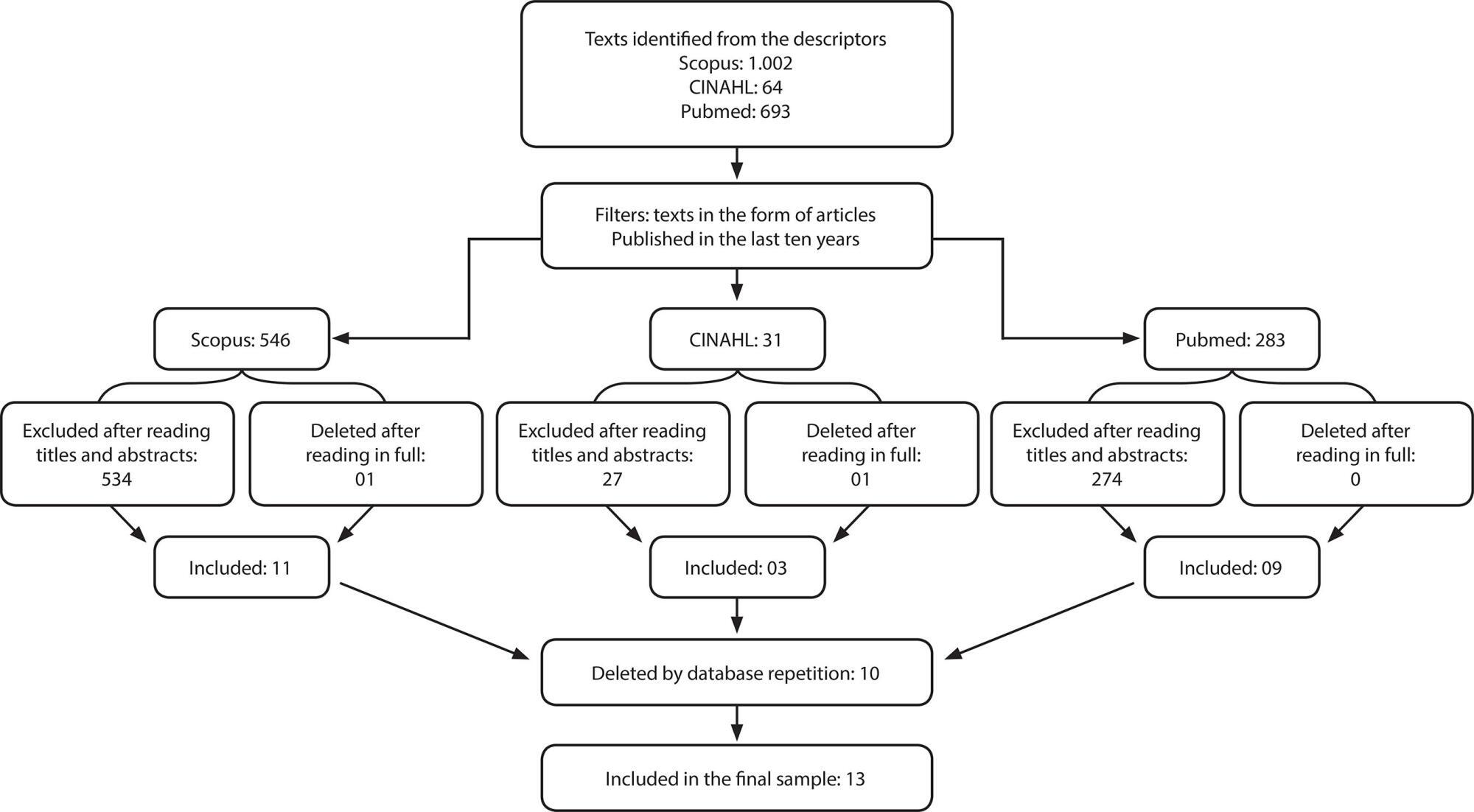
-
ARTÍCULO ORIGINAL21/10/2019
Hipermídia educativa sobre assistência de enfermagem ao parto: construção e validação de conteúdo e aparência
Revista Brasileira de Enfermagem. 2019;72(6):1471-1478
Resumen
ARTÍCULO ORIGINALHipermídia educativa sobre assistência de enfermagem ao parto: construção e validação de conteúdo e aparência
Revista Brasileira de Enfermagem. 2019;72(6):1471-1478
DOI 10.1590/0034-7167/2018-0163
Visualizações1Ver maisRESUMO
Objetivo:
construir uma hipermídia educativa sobre a assistência de enfermagem ao parto de risco habitual e realizar a validação de conteúdo e de aparência.
Método:
pesquisa metodológica, realizada seguindo as seguintes etapas: levantamento do conteúdo e planejamento dos módulos; produção das mídias e organização das unidades tutoriais; organização do espaço do aluno, tutor e de comunicação entre eles; elaboração da hipermídia; disponibilização da hipermídia; avaliação por especialistas em Enfermagem e Informática; e implementação das sugestões propostas.
Resultados:
a hipermídia educativa mostrou-se como um material validado, visto que apresentou um ótimo índice de validade de conteúdo global de 0,97 e significância estatística no teste binomial para o conteúdo e aparência.
Conclusão:
acredita-se que o uso deste material com alunos da graduação em Enfermagem contribuirá com a qualidade da assistência obstétrica, tendo em vista que se constitui em uma tecnologia ilustrada capaz de favorecer o ensino-aprendizagem sobre parto normal humanizado.
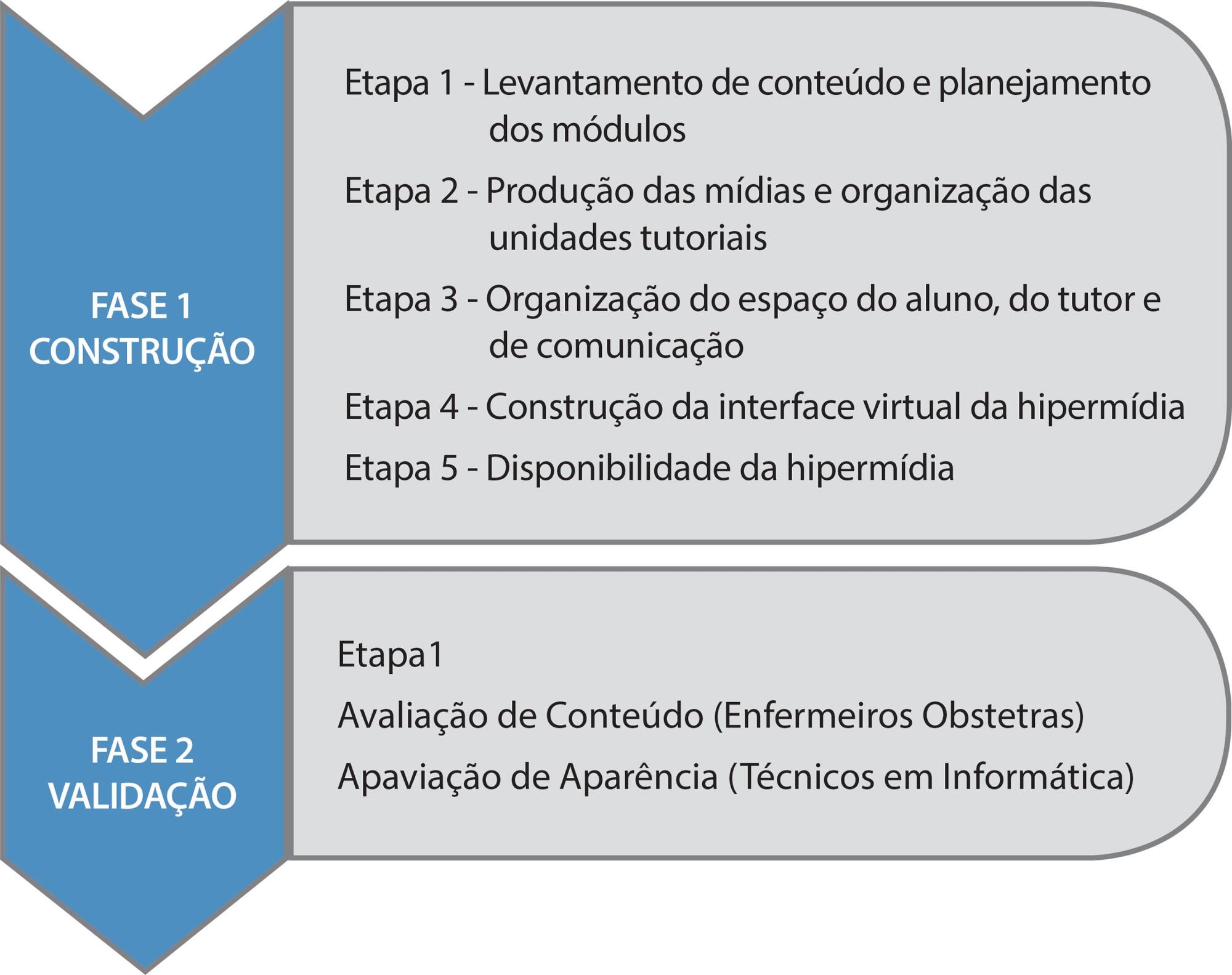
-
ARTÍCULO ORIGINAL30/03/2020
Boas Práticas de segurança nos cuidados de enfermagem em Terapia Intensiva Neonatal
Revista Brasileira de Enfermagem. 2020;73(2):e20180482
Resumen
ARTÍCULO ORIGINALBoas Práticas de segurança nos cuidados de enfermagem em Terapia Intensiva Neonatal
Revista Brasileira de Enfermagem. 2020;73(2):e20180482
DOI 10.1590/0034-7167-2018-0482
Visualizações0RESUMO
Objetivos:
identificar a percepção dos profissionais de enfermagem sobre o erro humano nos cuidados de enfermagem na Unidade de Terapia Intensiva Neonatal; analisar as estratégias de Boas Práticas propostas por esses profissionais para a segurança do paciente nos cuidados de enfermagem.
Métodos:
estudo quanti-qualitativo, descritivo. Cenário: Unidade de Terapia Intensiva Neonatal. Participantes: 22 profissionais de enfermagem. Coleta dos dados realizada por meio de entrevistas e submetidos a análise temática.
Resultados:
erro humano nos cuidados de enfermagem, identificando-se perdas de cateteres e erros no processo de medicação; causas para o erro nos cuidados de enfermagem, destacando-se a sobrecarga de trabalho; Boas Práticas para a segurança do paciente nos cuidados de enfermagem, como capacitação profissional e melhorias das condições de trabalho.
Conclusões:
demonstra-se a importância de investir em estratégias de Boas Práticas para a Segurança do Paciente, buscando-se sedimentar a cultura de segurança organizacional e estimular um ambiente propício ao gerenciamento do erro.
Palavras-chave: EnfermagemErros MédicosGestão de SegurançaSegurança do PacienteUnidades de Terapia Intensiva NeonatalVer mais -
ARTÍCULO DE REVISIÓN29/09/2022
Nursing students’ learning from involvement in research projects: an integrative literature review
Revista Brasileira de Enfermagem. 2022;75(1):e20210053
Resumen
ARTÍCULO DE REVISIÓNNursing students’ learning from involvement in research projects: an integrative literature review
Revista Brasileira de Enfermagem. 2022;75(1):e20210053
DOI 10.1590/0034-7167-2021-0053
Visualizações0Ver maisABSTRACT
Objective:
To identify the learning outcomes and skills obtained of undergraduate nursing students involved in research projects.
Methods:
This was an integrative literature review, based on a research protocol in the CINAHL Complete databases; Cochrane Central Register of Controlled Trials; Cochrane Database of Systematic Reviews; Cochrane Methodology Register; MedicLatina; MEDLINE, Scopus and JBI, including primary and secondary studies, published between 2015 and 2020.
Results:
A total of five heterogeneous articles were included, which were categorized using Kirkpatrick’s (adapted) model. Seventeen learning outcomes acquired through participation in research projects were identified, from the learning of new knowledge and skills to the development of new attitudes and behaviors.
Final considerations:
The involvement of nursing students in research projects is important to their professional development. Future investment in research on this topic can help cement the potential of this type of student involvement.
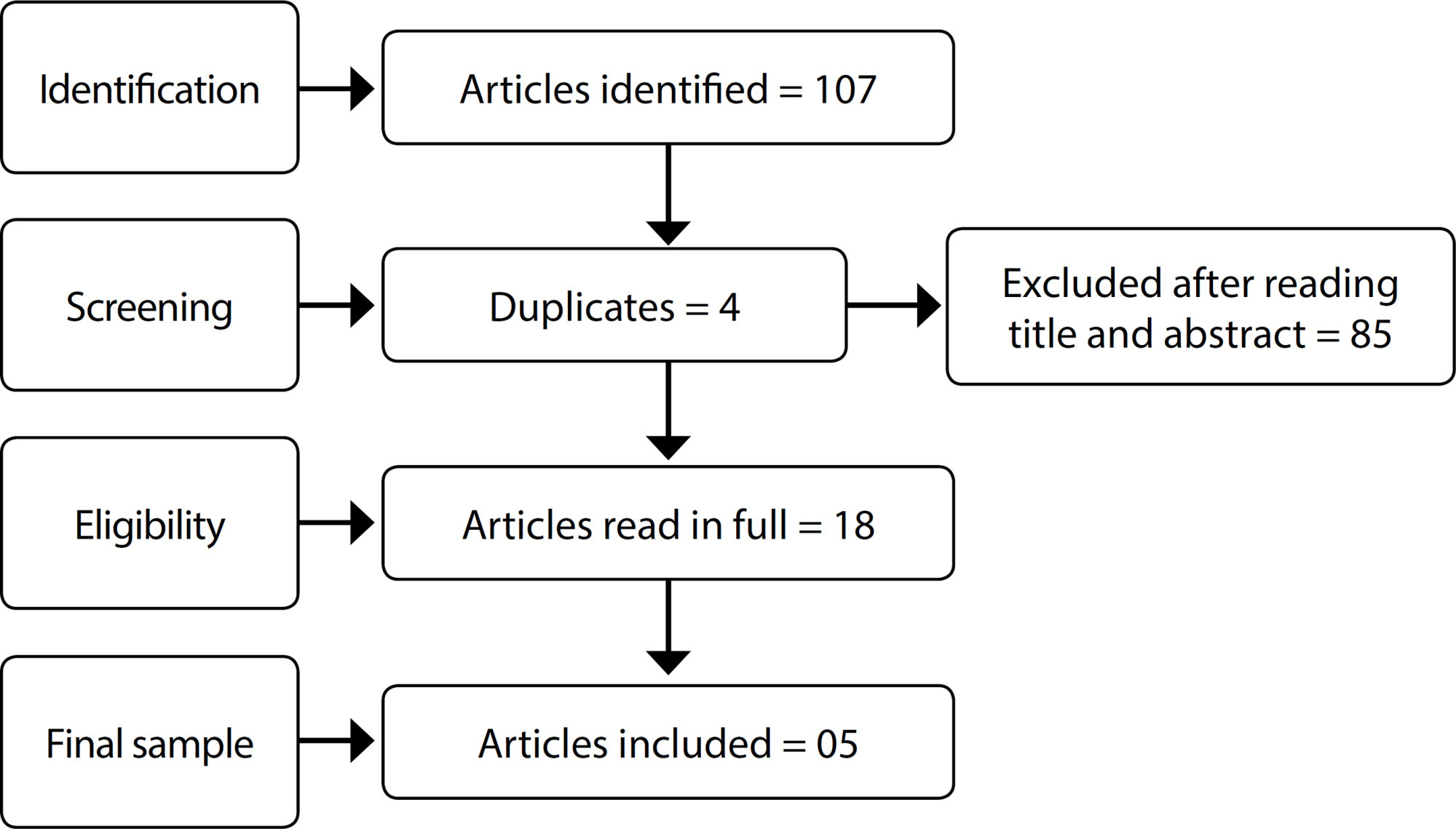
-
ARTÍCULO ORIGINAL05/12/2019
Qualidade de vida relacionada à saúde em pacientes com insuficiência cardíaca
Revista Brasileira de Enfermagem. 2019;72:140-146
Resumen
ARTÍCULO ORIGINALQualidade de vida relacionada à saúde em pacientes com insuficiência cardíaca
Revista Brasileira de Enfermagem. 2019;72:140-146
DOI 10.1590/0034-7167-2018-0368
Visualizações1RESUMO
Objetivo:
Avaliar a qualidade de vida relacionada à saúde dos pacientes com insuficiência cardíaca e relacionar aos dados sociodemográficos e clínicos.
Método:
Trata-se de estudo observacional, de corte transversal, com abordagem quantitativa realizado em ambulatório de insuficiência cardíaca no estado de Pernambuco.
Resultados:
Na amostra (n=101) houve predominância de homens, maiores de 60 anos, casados, profissionalmente inativos. A qualidade de vida relacionada à saúde, a partir do questionário Minnesota Living With Heart Failure Questionnaire foi considerada moderada (34,3±21,6), apresentando relação significativa com idade (p=0,004), classe funcional (p<0,001) e em pacientes com cardiopatia chagásica (p=0,02).
Conclusão:
A qualidade de vida no grupo IC de etiologia chagásica esteve mais comprometida, especialmente na dimensão emocional. Sugere-se a realização de estudos abordando as hipóteses de que maior tempo de acompanhamento ambulatorial melhora a qualidade de vida e que ter doença de Chagas interfere negativamente na qualidade de vida de pacientes com insuficiência cardíaca.
Palavras-chave: Assistência AmbulatorialDoença de ChagasEnfermagemInsuficiência CardíacaQualidade de VidaVer mais -
ARTÍCULO DE REVISIÓN21/12/2020
Aplicação da metodologia Lean Seis Sigma nos cenários de assistência à saúde: revisão integrativa
Revista Brasileira de Enfermagem. 2020;73:e20190861
Resumen
ARTÍCULO DE REVISIÓNAplicação da metodologia Lean Seis Sigma nos cenários de assistência à saúde: revisão integrativa
Revista Brasileira de Enfermagem. 2020;73:e20190861
DOI 10.1590/0034-7167-2019-0861
Visualizações0RESUMO
Objetivo:
analisar a produção científica sobre os resultados da metodologia Lean Six Sigma nas instituições de assistência à saúde.
Métodos:
revisão integrativa da literatura, com a seguinte pergunta: quais são os resultados nas instituições de saúde com a utilização da metodologia Lean Six Sigma e Six Sigma? A busca foi realizada nas bases de dados MEDLINE, LILACS, BDENF, CINAHL, Web of Science e Scopus, sem recorte temporal.
Resultados:
foram incluídos 34 artigos, publicados entre 2005 e 2019, sendo 52,9% provenientes dos Estados Unidos da América. As melhorias mais comumente encontradas foram em instituições hospitalares e na perspectiva dos clientes e processos internos.
Conclusão:
a utilização da metodologia Lean Six Sigma se demonstrou eficaz nos diversos cenários de assistência à saúde, se destacando uma lacuna em sua aplicação quanto ao engajamento e capacitação de pessoas.
Palavras-chave: Administração em SaúdeAssistência à SaúdeControle de QualidadeGestão da Qualidade TotalMelhoria de QualidadeVer mais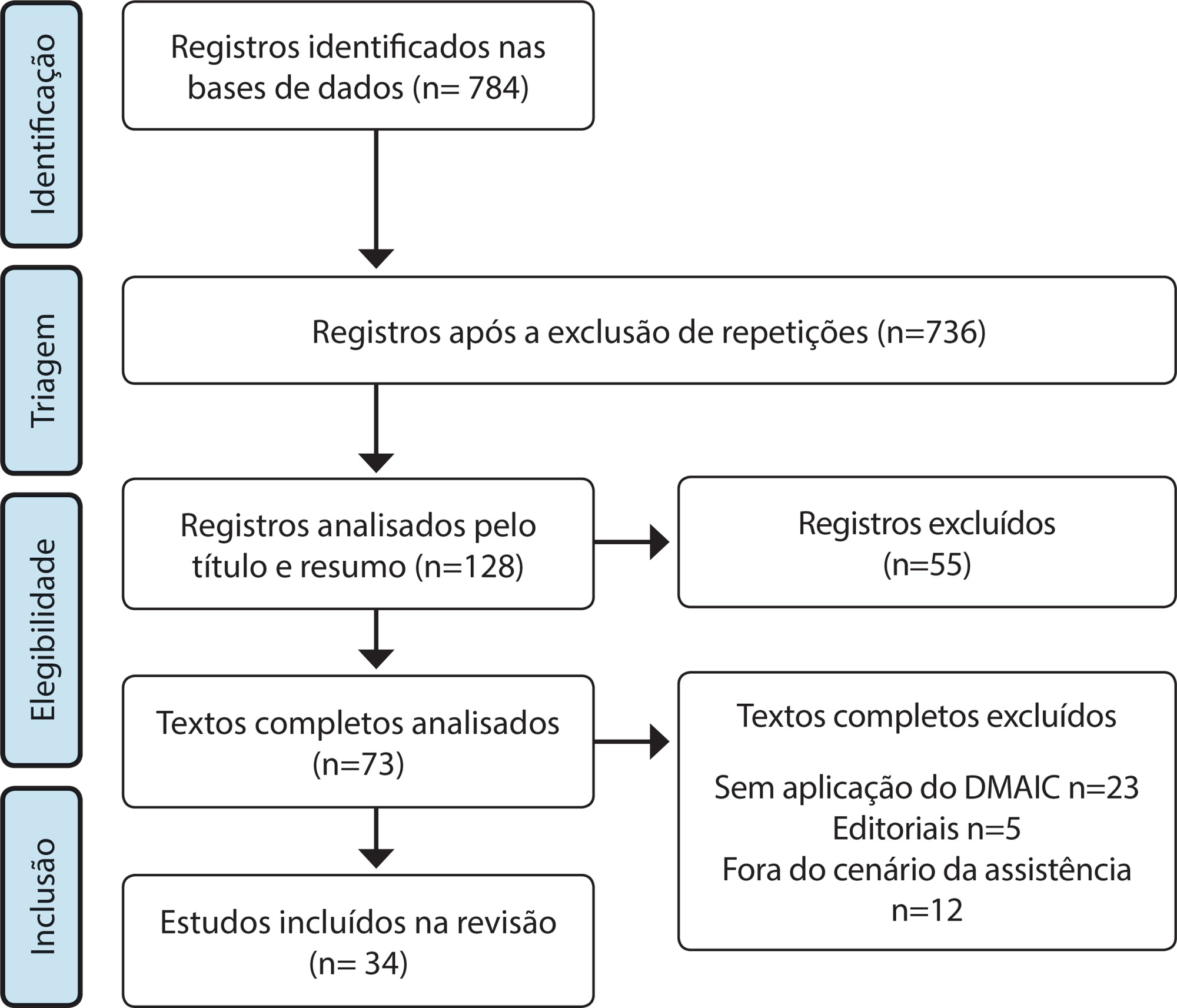
-
ARTÍCULO ORIGINAL17/02/2020
Análise dos registros de técnicos de enfermagem e enfermeiros em prontuários
Revista Brasileira de Enfermagem. 2020;73(2):e20180542
Resumen
ARTÍCULO ORIGINALAnálise dos registros de técnicos de enfermagem e enfermeiros em prontuários
Revista Brasileira de Enfermagem. 2020;73(2):e20180542
DOI 10.1590/0034-7167-2018-0542
Visualizações0RESUMO
Objetivos:
analisar as principais não conformidades dos registros de enfermagem de um hospital público do Nordeste na cidade de Natal.
Métodos:
estudo descritivo, transversal, abordagem quantitativa. Realizado em enfermarias médicas e cirúrgicas. Amostra composta de 120 prontuários de pacientes internados entre outubro e dezembro de 2016. Os dados obtidos foram tabulados e analisados por estatística simples em frequência absoluta e relativa com o software Microsoft Excel 2013. Para avaliar as não conformidades dos registros, usou-se o Diagrama de Pareto.
Resultados:
como principais problemas nos registros de enfermagem, destacou-se a ausência da categoria profissional e número do conselho, responsáveis por 41,8% das não conformidades nos registros de técnicos de enfermagem, enquanto nas anotações dos enfermeiros foram a ausência de hora e as letras ilegíveis, com 61,2%.
Conclusões:
o estudo evidenciou que os profissionais de enfermagem realizam seus registros de forma incompleta e que muitas vezes não documentam o cuidado prestado.
Palavras-chave: ComunicaçãoEnfermagemPesquisa sobre Serviços de SaúdeRegistros de EnfermagemSegurança do PacienteVer mais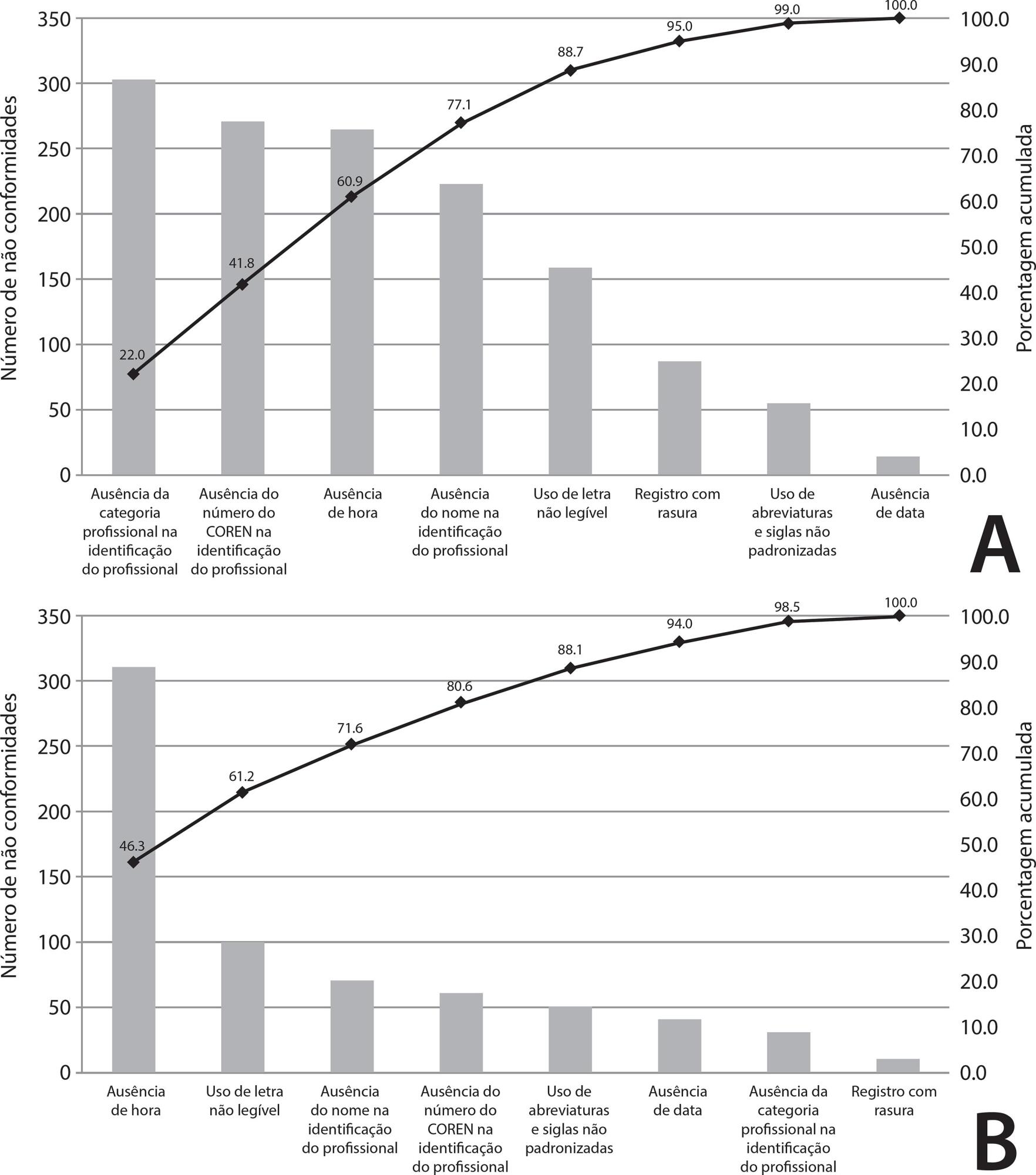
Búsqueda
Buscar en:
Nuvem de Tags
Adolescente (85) Atenção Primária à Saúde (239) COVID-19 (91) Criança (91) Cuidados de Enfermagem (269) Educação em Enfermagem (151) Educação em Saúde (139) Enfermagem (930) Enfermagem Pediátrica (86) Estudantes de Enfermagem (77) Estudos de Validação (131) Família (87) Idoso (208) Promoção da Saúde (99) Qualidade de Vida (104) Saúde do Trabalhador (86) Saúde Mental (145) Saúde Pública (82) Segurança do Paciente (150) Tecnologia Educacional (100)



